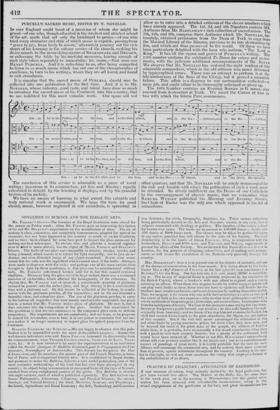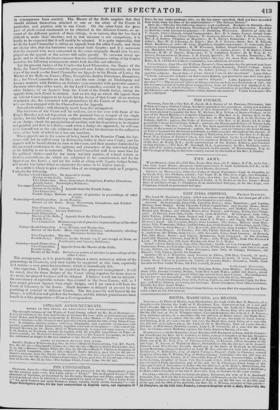PRACTICE OF CHANCERY; ATTENDANCE OF BARRISTERS.
A new measure of reform, long- ardently desired by the legal profession, has just been carried into effect. The Master of the Rolls, has, for some days in the week past, sat in the morning a Westminster; but this partial refor- mation has been attended with considerable inconvenience, owing to the mixed engagements of the gentlemen at the bar; and great dissatisfaction has in consequence been excited. The Master of the Rolls requires that they should declare themselves attached to one or the other of the Courts in particular, and practise only in one Court. On the other hand, the pros- pect of profe4sional emolument to be obtained in the different Courts, on ac- count of the different periods of their sittings, is so various, that the bar find it difficult to make their election; and as that measure is not compulsory, it is hardly to be expected that it will readily be adopted. It is quite impossible, that while the Lord Chancellor is sitting on appeals from the other Courts, and these are sitting also, that the barristers can attend both Courts; and it is necessary that the counsel who were concerned in the cause originally should also be em- ployed on the appeal, or the suitors will suffer greatly. To occasion fewer op- pet als and to obi jute the inconvenience that the simultaneous sitting of the Courts occasion, the following arrangement seems both feasible and effective.
Let the present Judges of the Court—the Lord Chancellor, the Master of the Rolls, the Vice-Chancellor,—and the proposed new Judge, sit separately on three days of the week ;—the Lord Chancellor on Appeals in the House of Lords; the Master of the Rolls on Causes, Pleas, Exceptions, further Directions, Demurrers, &c.; the Vice-Chancellor on the like ; and the new Judge on Bankruptcy and Lunacy matters, with Petitions on Statutes (unconnected with particular causes). On three other days of the week, let the Lord Chancellor, assisted by two of the other Judges, sit on Appeals from the Court of the Fourth Judge, taking the appeals from each Court in rotation. And on the day on which the appeals from an itiferior Court happen to be heard, let the Judge of that Court sit on motions of practice, Sze. &c. connected with proceedings in the Courts of the two Judges who are then engaged with the Chancellor on the Appeals.
Several advantages will obviously result from this arraugment.
The decisions of the Court will be' uniform, (as is the case with those of the King's Bench,) and not dependent on the personal bias or temper of the single Judge ; for the habit of considering subjects together, will improve the ignorance of one Judge, check the precipitation of another, and the disposition to be singular and peculiar and first in a third :—and when a Judge sits separately, he will con- sider himself not as time sole arbitrator, but will refer his decisions to the collective viev,s of the hotly of which he is but one member.
When appeals are in the course of being heard in the Superior Court, the bar- risters will not be called away by distracting duties in their own Court; and the appeals will be heard almost as soon as the cause, and their number diminished by the increased confidence in the opinions and characters of the individual Judge, as his liability to err is removed. The Lord Chancellor will have more time for his political duties—and for the many weighty matters, of a legal nature, as treaties, conventions, &c. which are subjected to his consideration, and for the Appeals on the Lords ; and yet his habit of sitting with Equity Judges below; will render him better fitted to administer his duties in his higher station.
As a table is likely to give a clearer idea of an arrangement such as I propose, I subjoin the following.
1,Uurclay —Lord Chancellor. On Appeals in Lords.
Master of the Rolls. Causes.
Vice Chancellor. Pleas, Demurrers, Exceptions, Further Directions. /mirth Judge. Bankruptcy Petitions. Tuesetar—Lord Chancellor,
Master of the Rolls,} Appeals from the Fourth Judge. Vice Chancellor.
Fourth Judge. Motions on points of practice in proceedings of other
Courts.
Wednesday—Lord Chancellor. As on Monday.
Master of the Rolls. Pleas, Demurrers, Exceptions, and Further
Directions.
Vice Chancellor. Causes.
Fourth Judge. Lunacy Petitions.
Thursday—Lord Chancellor, )
Master of the Rolls, Appeals from the Vice Chancellor.
1,'urth Judge.
Vic e Chancellor. Motions on point of practice) in proceedings of the other Courts.
Friday—Lord Chancellor. As on Monday and Wednesday.
Master of the Rolls. More important Motions, substantially affecting
the causes before him.
Vice Chancellor. The nice.
Fourth Judge. Petltions on the Statute (or, if not enough of them, on 3talikruptcy and Lunacy Petitions.)
Saturday—Lord Chancellor, Vice Chancellor, Appeals from the Master of the Rolls. Fourth Judge.
Master of the Rolls. Motions on points of practice in proceedings of the other Courts.
This arrangement, as it is practicable without a more extensive reform of the proceedings in..Chaneery, may very rightly be suggested at this time, especially as it reaches a very great inconvenience which is immediately felt.
One objection, I think, will be started to this proposed arrangement : it will be stated, that the three Judges of the Court sitting together for three days in the week, the general business will be delayed. I believe it will not be delayed : the consistency of equitable notions thus created in the three Courts, will, as I have stated. prevent Appeals from single Judges, and I am sure it will front the Court of Chancery to the Lords. Much business is delayed at present by the practising of counsel in different Courts. The bar eenerally will benefit by the changn ; it will divide and quicken the business, and the inferior practitioners must benefit in a like proportion.--Fronz a Correspondent.



















 Previous page
Previous page